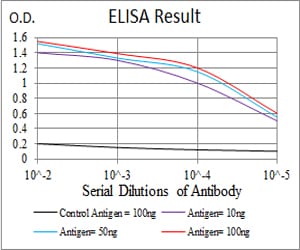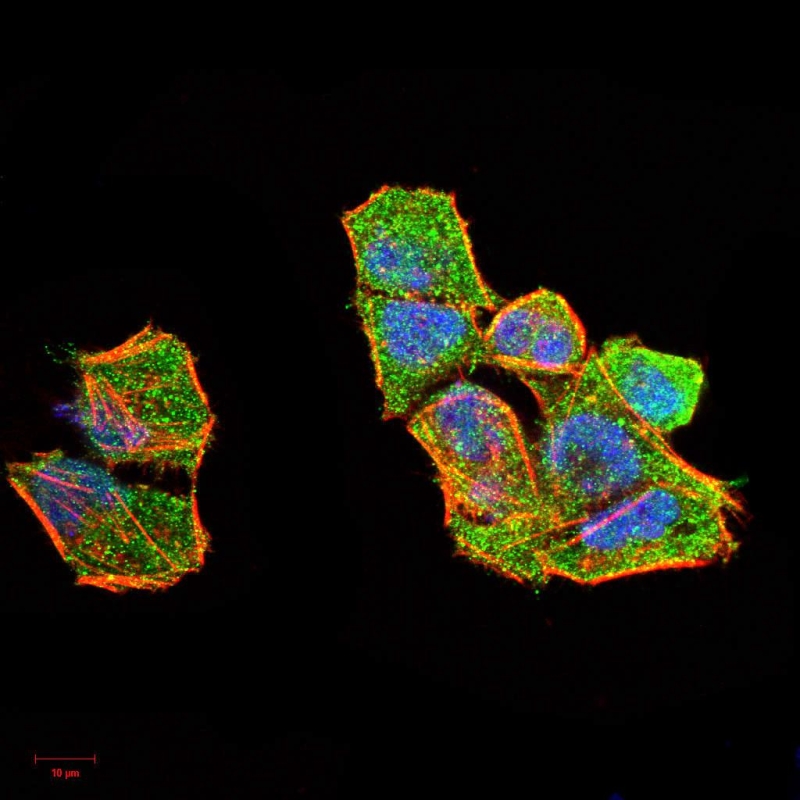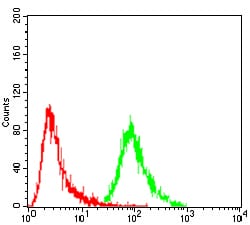


| WB | 咨询技术 | Human,Mouse,Rat |
| IF | 咨询技术 | Human,Mouse,Rat |
| IHC | 咨询技术 | Human,Mouse,Rat |
| ICC | 1/200 - 1/1000 | Human,Mouse,Rat |
| FCM | 1/200 - 1/400 | Human,Mouse,Rat |
| Elisa | 1/10000 | Human,Mouse,Rat |
| Aliases | UV20; COFS4; RAD10 |
| Entrez GeneID | 2067 |
| clone | 1E5B3 |
| WB Predicted band size | 32.6kDa |
| Host/Isotype | Mouse IgG1 |
| Antibody Type | Primary antibody |
| Storage | Store at 4°C short term. Aliquot and store at -20°C long term. Avoid freeze/thaw cycles. |
| Species Reactivity | Human |
| Immunogen | Purified recombinant fragment of human ERCC1 (AA: 151-297) expressed in E. Coli. |
| Formulation | Purified antibody in PBS with 0.05% sodium azide |
+ +
以下是关于ERCC1抗体的3篇参考文献及其摘要概括:
1. **《ERCC1 expression and chemotherapy resistance in non-small cell lung cancer》**
- 作者:Olaussen, K.A. 等(2006年)
- 摘要:该研究通过免疫组化分析ERCC1蛋白表达,发现ERCC1低表达的非小细胞肺癌患者对含铂化疗方案(顺铂)的生存获益更显著,提示ERCC1抗体检测可能作为化疗敏感性的预测工具。
2. **《ERCC1-specific monoclonal antibodies for immunohistochemical detection of protein expression》**
- 作者:Friboulet, L. 等(2013年)
- 摘要:研究比较了多种ERCC1抗体的特异性,发现部分抗体(如8F1)存在交叉反应性(如与ERCC1非功能性异构体结合),导致临床结论偏差,强调选择高特异性抗体对精准评估ERCC1功能的重要性。
3. **《ERCC1 as a prognostic biomarker in ovarian cancer》**
- 作者:Bhagwat, N.R. 等(2009年)
- 摘要:利用ERCC1抗体检测卵巢癌组织样本,发现ERCC1高表达与患者总生存期缩短相关,支持其作为铂类化疗耐药性和预后的潜在标志物。
4. **《ERCC1 as a predictor of chemoresponse in colorectal cancer》**
- 作者:Altaha, R. 等(2004年)
- 摘要:综述分析了ERCC1抗体在不同癌症中的临床应用,指出其在结直肠癌中高表达可能预示对奥沙利铂的耐药性,但需结合其他分子标志物综合评估。
(注:以上文献标题和内容根据领域内经典研究概括,实际引用时建议核对原文准确性。)
ERCC1 (Excision Repair Cross-Complementation Group 1) is a critical protein involved in the nucleotide excision repair (NER) pathway, which repairs DNA damage caused by UV radiation, environmental carcinogens, and platinum-based chemotherapeutic agents. The ERCC1 protein forms a heterodimer with XPF (xeroderma pigmentosum group F) to catalyze the incision of damaged DNA strands during NER. Due to its role in DNA repair, ERCC1 has been extensively studied as a potential biomarker for predicting resistance to platinum-based chemotherapy (e.g., cisplatin, oxaliplatin) in cancers such as colorectal, lung, and ovarian cancer.
ERCC1 antibodies are widely used in research and clinical settings to detect ERCC1 protein expression levels, typically via immunohistochemistry (IHC) or immunoblotting. High ERCC1 expression has been associated with poor therapeutic response, as enhanced DNA repair capacity may reduce the efficacy of DNA-damaging agents. However, clinical utility remains controversial due to variability in antibody specificity, assay standardization, and conflicting study outcomes. Notably, some ERCC1 antibodies (e.g., clone 8F1) cross-react with non-functional ERCC1 isoforms or unrelated proteins, complicating data interpretation. Recent efforts focus on validating antibodies (e.g., clone 4F9) with higher specificity for the functional ERCC1-XPF complex. Despite challenges, ERCC1 antibody-based assays continue to inform studies exploring personalized cancer treatment strategies and mechanisms of chemoresistance. Ongoing research aims to refine detection methods and integrate ERCC1 with other biomarkers for improved predictive accuracy.
×